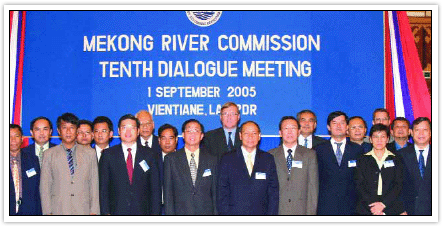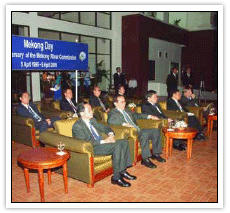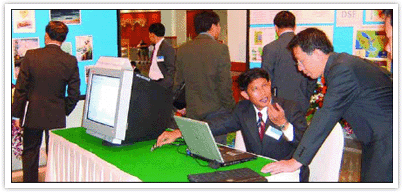2005 Corporate highlights
Chinese partnership strengthened
In June 2005, at the invitation of the Chinese Ministry of Foreign Affairs and the Ministry of Water Resources, MRC Secretariat Chief Executive Officer Dr Olivier Cogels and a delegation of the Secretariat's senior staff made an official visit to Beijing to hold technical consultations under the framework of cooperation between China and the MRC, within the scope of the Mekong Programme.
The delegation identified a number of potential areas of cooperation with the Ministry of Foreign Affairs, the Ministry of Water Resources and the Ministry of Communication, Information and Transport.
At meetings with officials, the CEO outlined the structure and procedures of the MRC and the nature of its work programme for the sustainable development of the Mekong River Basin.

These briefings were well received and spurred constructive discussions which identified potential areas for enhanced cooperation between the MRC and China. These included: increased communication and strengthened MRC-China cooperation within the current Dialogue Partnership; interest in the mathematical models of the MRC and cooperation within the Flood Management and Mitigation Programme; and promising cooperation opportunities under the Navigation Programme. The Ministry of Communications, Transport and Information expressed interest in joint activities on navigation safety training in China for the six Mekong countries.
The MRC Secretariat is anticipating an enhancement of its good relationship with China within these areas of cooperation.
Celebrating 10 years of cooperation
On 5th April 1995 Cambodia, Lao PDR, Thailand and Viet Nam came together to sign what became known and the 1995 Agreement and formed the Mekong River Commission.
On 5th April 2005 representatives from the four countries gathered again; this time to celebrate 10 years of cooperation at a reception held at the MRC Secretariat in Vientiane, Lao PDR.
The celebration was opened by Vice Prime Minister of Lao PDR, H.E. Mr Asang Laoly. Ministers and senior representatives of the four MRC member countries and MRCS CEO Dr Olivier Cogels, also gave short speeches. The underlying theme for all was the importance of the Mekong Spirit of cooperation.

Speakers pointed out that the past decade had been one of strengthening cooperation, in many ways, especially institutionally, in basin development planning, in developing water procedures, building human resources and becoming a financially secure organisation. In the coming decades it was important to maintain these ties of cooperation so the MRC could move forward in its goal to improve economic and social development within the basin. The Mekong Spirit that united the countries during troubled times and in good times must continue to flourish.
Dr Cogels proposed that 5th April be named Mekong Day and encouraged member countries to make it a day of celebration every year.
International Forum in Chiang Rai
As part of its ongoing 10th anniversary celebration, the MRC held an International Forum on Integrated Water Resources Management (IWRM) of the Mekong River Basin in Chiang Rai, Thailand in November, 2005. More than 170 people from around the world attended and participated in the forum. These included international experts, representatives from riparian governments and their line agencies, representatives from National Mekong Committees and river basin committees, development partners, scientists, researchers, students and stakeholders.
Joint planning and facilitation of investments in various water-related sectors, aiming at shared benefits for the Mekong countries, is the heart of the Mekong Programme. Achieving the right balance for sustainable development relates directly to managing the multiple claims on and uses of the Basin’s water resources.
It was with this in mind that the forum participants discussed and exchanged ideas on how IWRM principles can be applied at a basin scale to best meet the economic and social challenges facing the basin.
Sessions were held under themes reflecting the four main goals of the MRC’s new Strategic Plan 2006-2010: Meeting development needs; strengthening cooperation; maintaining the ecological balance and building capacity. Each session contained presentations from national and international speakers and was followed by a panel discussion with questions from the floor.
Prior to the main sessions presentations were made by H.E. Mr Krit Kraichitti, Thailand’s Ambassador to Viet Nam, who was part of the negotiation team which drafted the historic 1995 Agreement, and Mr Les Roberts, General Manager Natural Resources, Murray Darling Basin Commission of Australia.
An exhibition highlighting the achievements of the MRC over the past decade complemented the forum.
The International Forum on Integrated Water Resources Management was made possible through the support of the governments of Australia, Germany and Sweden with assistance from the Thai National Mekong Committee and the MRCS.
Working together with stakeholders
Promoting regional cooperation for sustainable development plays a key role in the operation of the MRC and it knows that stakeholder involvement in decision-making is fundamental to achieving feasible, equitable and lasting solutions and that the quality of decisions can be improved by the inclusion of stakeholders who bring to the process important knowledge and relevant perspectives.
One of the MRC Secretariat's objectives is to invite greater participation from partners and stakeholders who share MRC strategic objectives for sustainable development in the Mekong River Basin.
These stakeholders include donor agencies, private sector groups, research institutions, civil society organisations, the media and other groups which can potentially contribute to the Lower Mekong Basin development planning process by providing information and participating in discussions during the planning process.
It was with these goals in mind that, on 8 August 2005, the Secretariat held the first Regional MRC Stakeholder Meeting in Vientiane, which gathered together representatives of several UN agencies, NGOs, the Asian Disaster Preparedness Centre and partner programmes to share their views on the MRC's Strategic Plan 2006-2010.
The Secretariat's aim is to foster a new spirit of openness and inclusiveness among itself and all those working toward poverty reduction and sustainable development in the region. The MRC Regional Stakeholder Meeting will become a regular event in the MRC calendar.
New programmes meet basin needs
At the 12th meeting of the MRC Council in Chiang Rai the Council approved the formation of three new programmes: a Drought Management Programme, the Information and Knowledge Management Programme (IKMP - formerly the Decision Support and Information Management Programme) and a Tourism Programme.
The MRC Secretariat has established a task force under its Operations Division to prepare a proposal for a Drought Management Programme. The Drought Management Programme will have strong links with the Flood Management and Mitigation Programme; the Agriculture, Irrigation and Forestry Programme and the Water Utilisation Programme.

Development of the programme proposal will be based on a study on Drought Forecasting and Management carried out in 2005 by the MRCS. The main objective of this study was to enable identification of deficient hydrological conditions resulting from the natural variability of the regional climate and to be able to distinguish these from impacts of resource developments and interventions.
The IKMP was originally introduced in the Work Programme 2005 following the request of the Joint Committee at its 18th Meeting in 2003 to take action regarding sustainability of the MRCInformation System (MRC-IS), and to prepare a proposal on allocation of funds for the development, implementation and maintenance of the MRC-IS for submission to donors. The Joint Committee at its Twentieth Meeting also highlighted the needs for hydrological data collection.
The IKMP is already operating activities under the umbrella of the Technical Support Division, but will embark on a six-month preparation to form a fully-fledged programme in the first quarter of 2006 and commence implementation in mid 2006.
Development of the Tourism Programme will be based on an analysis of needs and opportunities of the countries and it will be linked with related projects carried out under the tourism sector of the Asian Development Bank’s Greater Mekong Subregion initiative and those being carried out by the Transport, Communications and Tourism Division of ESCAP, especially the Mekong/Lancang River Tourism Planning Study.
A baseline study on tourism is also being undertaken under the Environment Programme. This assessment will include an analysis of the MRC’s comparative advantage in tourism, thus allowing for future programme development.
Strategic Plan 2006-2010
In 2006 the MRC starts a new five-year cycle in its strategic planning. Within the strategic plan 2006–2010, the fundamental strategic direction of MRC and its vision statement remain, but the plan provides for an updated programme structure in a sector and cross-cutting programmes matrix, all feeding into an overlying basin development planning process. This will allow the MRC to address the development opportunities of the Mekong Basin in a more balanced and sustainable manner. The overall five year goal of the MRC will be: “More effective use of the Mekong’s water and related resources to alleviate poverty while protecting the environment”.
See page 34 for more on the new Strategic Plan.
MRC on display
The MRC participated in World Water Week, held in Stockholm, Sweden in August 2005. The MRC’s Water Utilisation Programme, made a presentation and the MRC shared an exhibition booth with the Challenge Programme on Water and Food (CPWF). The MRC is the coordinating institution for the CPWF in the Mekong region.
Two days later, the MRC and National Mekong Committee delegates joined The Southeast Asian Water Forum (SEAWF) in Bali, Indonesia. Here MRC co-convened a session entitled ‘Reducing Vulnerability to Floods, Drought and Other Water-Related Disasters’ with the Japan Bank for International Cooperation and the International Flood Network.
Six papers were presented during the session, which included one by the MRC entitled “Flood Forecasting and River Monitoring Systems in the Mekong River Basin”. Results from the session and recommendations were presented to the SEAWF Plenary for reference to the Forum’s Ministerial Meeting and for delivery to the 4th World Water Forum, to be held in Mexico in March 2006.
Choose a newsletter: